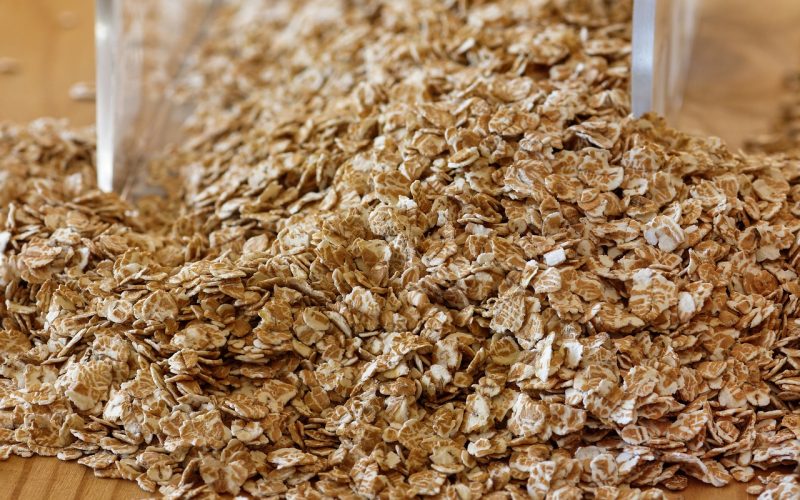Oat flour is a popular baking substitute for gluten-containing wheat flour due to its naturally gluten-free composition.
When looking for substitutes for Oat flour, other gluten-free flour can be used in any recipe that calls for oat flour, such as almond flour, coconut flour, chickpea flour, quinoa flour, and even arrowroot starch.
Each of these substitutes for Oat flour has unique flavor profiles and nutritional benefits that can help create delicious and healthy baked treats.
As a bonus, many of these flours are also budget-friendly alternatives to oat flour.
Experimenting with different combinations of flours can lead to exciting new delicious, and nutritious creations!
1. Coconut Flour
Coconut flour is first on our list of substitutes for Oat flour. It is a great alternative to gluten-free oat flour, low in carbohydrates and calories, yet provides a good source of dietary fiber.
This flour can be used in baking and cooking as a 1:1 replacement for conventional flour.
Coconut flour also helps reduce the glycemic index of foods due to its high fiber content and thus promotes slow digestion and lasting energy levels throughout the day.
Additionally, coconut flour contains healthy fatty acids that are beneficial for the heart, brain, and overall bodily well-being.
2. Chickpeas
Chickpea flour is one of the best substitutes for Oat flour flours. It’s high in protein and fiber, gluten-free, and a perfect substitution for ready-made breading mixes or batters.
Compared to wheat flour, it yields even better results when used in baking as it has a lighter texture and absorbs moisture better from other ingredients.
Chickpea flour is also easily digested by most people and can be used as a primary ingredient or an enhancer in many dishes, such as French fries, pancakes, and pasta made with chickpeas.
All these qualities make the substitutes for Oat flour an inexpensive choice while still seeing the health benefits.
3. Soy flour
Soy flour is great for those looking for an alternative to oat flour. Unlike oat flour, soy flour offers a significantly higher amount of protein, so it can be substitutes for Oat flour as other main ingredients if you want to bump up the nutrition in any baking recipe.
Moreover, it has a mild nutty flavor which pairs great with baked goods like cakes and cookies.
Soy flour has several health benefits, including lowering cholesterol and helping regulate insulin levels.
It’s a great vegetarian-friendly option, perfect for anyone looking to reduce gluten intake without sacrificing taste or texture!
4. Almond Flour
Almond flour is a great substitute for oat flour for baking. Almond flour is dense, rich in protein and healthy fats, gluten-free, high in dietary fiber, and low in digestible carbohydrates.
Its subtle sweetness makes it perfect for desserts or anywhere you might want to enhance the flavor of a recipe.
Furthermore, almond flour can be used as a direct measurement replacement for oat flour in most recipes.
This makes the substitutes for Oat flour an easy option when experimenting with gluten-free alternatives.
5. Quinoa Flour
Quinoa flour is an excellent substitute for traditional oat flour when baking or cooking.
It is a healthy alternative because of its higher protein content, essential minerals, and fiber than other gluten-free flour like almond meals or coconut flour.
Quinoa flour adds a nutty flavor that complements baked goods particularly well. It also provides texture, density, and extra fiber for heart health.
Quinoa is also easier to digest than grains, making it an excellent option for people who cannot tolerate gluten or processed wheat products.
6. Buckwheat Flour
Buckwheat flour is the perfect substitute for oat flour in gluten-free baking recipes. It has a nutty flavor and is high in protein and dietary fibers.
Buckwheat can make pancakes, waffles, bread, muffins, and other baked goods with little adjustments to an original recipe for oat flour.
What makes buckwheat flour one of the substitutes for Oat flour special is its low glycemic index which helps to keep blood sugar levels stable after meals.
With all its nutritional benefits, buckwheat flour could be one of the healthier options for substitutes for Oat flour in recipes.
7. Rye Flour
Rye flour is a fantastic substitute for oat flour in many baking recipes. It has similar gluten content, so substitution is easy.
Rye is more flavorful than oat flour, giving your baking that unique taste.
Moreover, rye flour contains more fiber than oat flour, so this can be a great option if you want extra dietary fiber in your recipe.
The dense texture of rye also means that it produces denser bakes than oat flour, making it perfect for use in brownies, muffins, and cookies where a flaky and soft texture isn’t desired.
8. Oatmeal
Oatmeal is one of the best substitutes for oat flour because it is easy to use and can be used in any recipe to replace oat flour.
Oatmeal has many health benefits and adds a creamy texture to dishes.
It also contains essential vitamins and minerals such as calcium, iron, magnesium, phosphorus, potassium, zinc, copper, and manganese.
Oatmeal is also a good protein and dietary fiber source that helps regulate digestion, making it an ideal food for weight loss.
Additionally, oatmeal helps reduce cholesterol levels and retains essential nutrients that would otherwise be lost when rolled or steel-cut oats are made into flour.
9. Millet Flour
Millet flour is a great alternative to oat flour, as it has similar consistency and structure.
This gluten-free option is slightly milder in flavor than oats and is a great protein, fiber, and magnesium source.
It’s also excellent for baking vegan items such as pancakes, muffins, and cakes due to its grainy texture.
In baking recipes, millet can provide an additional boost of vitamins and minerals when used with other flour, such as white or wheat flour.
Including this nutritious flour in your everyday cooking will help add some extra nutrition without sacrificing the deliciousness of your food!
10. Amaranth Flour
Amaranth flour is a great substitute for oat flour, especially for those who follow a gluten-free diet.
It’s high in protein, fiber, essential fatty acids, and vitamins, making it a much healthier alternative to other flours.
While it does have a slightly more intense flavor than oat flour, amaranth is highly versatile and can be used in most dishes that generally call for oat flour, including baked goods.
Amaranth, one of the substitutes for Oat flour, also tends to produce denser baked goodies due to its higher protein content.
So while it may take some getting used to at first, amaranth flour is worth trying!
11. Brown Rice Flour
Brown rice flour is last on our excellent list of gluten-free substitutes for Oat flour in baking recipes.
It’s made from ground, whole-grain brown rice, so it retains all the nutritional benefits of this nutritious grain.
Thanks to its neutral flavor and light color, brown rice flour can be used as a one-for-one substitute for white or wheat flour in most baked goods.
It also adds extra fiber, protein, and vitamins B1 and B3 to recipes, making it a healthier choice for baking.
Additionally, its composition and absorbency work well when binding ingredients in batters or doughs, making it an ideal choice for baked treats like bread, muffins, and cakes.
Conclusion
After evaluating several of the best substitutes for oat flour, it is clear that there are many options.
The right option depends on what you are looking for in terms of taste and texture, health benefits, and cooking/baking time requirements.
Among the top contenders are almond meal/flour, coconut flour, buckwheat flour, and cornmeal.
Depending on your preferences and needs, you may find one of these substitutes for Oat flour more suitable than others, so be sure to research each one carefully before making a final decision.






